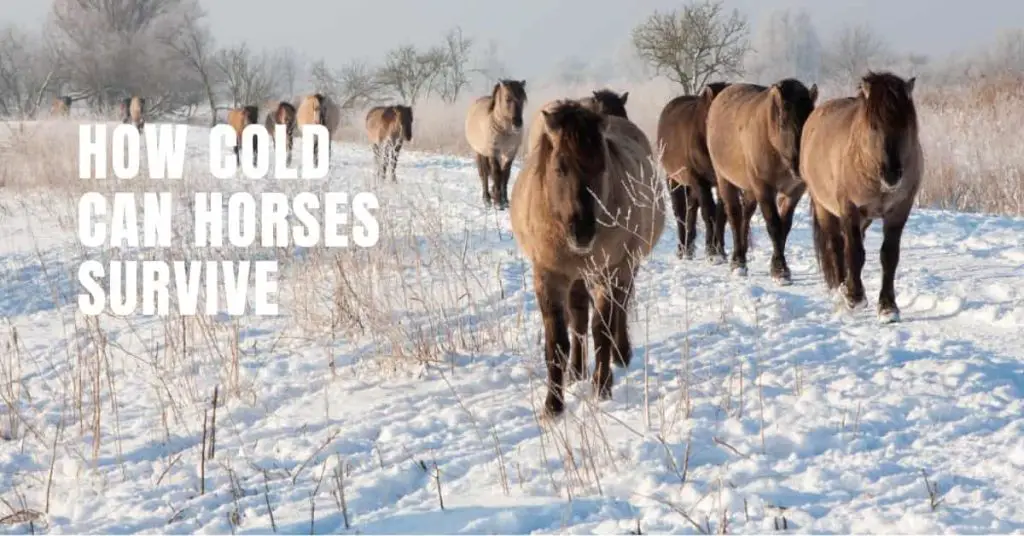Horses can survive in surprisingly cold temperatures as long as they are well nourished and have access to shelter from wind and wet weather. Generally, horses will do fine in temperatures down to -20°F (-29°C).
However, if the temperature dips below this point or is accompanied by strong winds and precipitation, the horse’s risk of hypothermia increases significantly.
Therefore, it is important that horse owners provide their animals with access to a warm barn or shed during extreme winter conditions. Additionally, it is important to ensure that your horse has enough food and water available to stay healthy throughout cold spells.
Horses are incredibly hardy animals and can survive in temperatures that humans would find unbearable. While horses naturally prefer mild climates, they have been known to thrive even in cold weather so long as their coats are kept healthy and warm. With proper nutrition and shelter from the elements, horses can happily live through temperatures well below freezing.
When to Bring Horses in for Winter
When the weather starts to get colder and the days become shorter, it is time to think about bringing horses in for winter. Horses should be brought inside when temperatures dip below freezing, and there is a consistent frost on the ground. This will help protect them from cold-related illnesses such as hypothermia, frostbite, and pneumonia.
Additionally, horse owners should provide their animals with ample hay or other forms of food that are high in fibre so they stay warm during this season.

Credit: equestrianspace.com
Winter Horse Care: Considerations for Breeds and Regional Climates
| Aspect | Considerations |
|---|---|
| Breeds | Some horse breeds, such as Icelandic or Siberian horses, are exceptionally well-suited for extreme cold. Consider choosing a breed that naturally thrives in your region’s winter conditions. |
| Regional Climate | The climate in your region matters. In dry, cold climates, focus on providing adequate shelter and insulation, while in wet, cold regions, manage moisture and prevent hazards like icy patches. |
| Emergency Care | Learn how to recognize signs of hypothermia or frostbite and have an emergency care plan in place. Immediate, informed action can make a significant difference. |
| Winter Exercise | Don’t forget to keep your horses active even during the winter. Create safe, sheltered areas for exercise, and ensure they get the physical activity they need. |
| Environmental Factors | Consider the type of shelter and environmental modifications you need. Construct winter shelters, manage paddocks to prevent muddiness, and prevent ice buildup in water sources. |
| Regional Variations | Be aware of regional variations. The requirements for horse care in a cold, dry climate differ from those in a cold, wet climate. Tailor your care approach to your specific region. |
What Happens If a Horse Gets Too Cold?
If a horse gets too cold, it can have serious health implications. The most obvious sign that a horse is getting too cold is shivering. This is the body’s way of generating heat, and if it continues for an extended period of time, it can cause fatigue and weakness.
Other signs of hypothermia in horses include depression or lethargy, decreased appetite, pale mucous membranes (gums), slowed heart rate and respiration rate, weak pulse, decreased coordination or muscle control, stiff limbs and muscles, dilated pupils or drooping eyelids. If left untreated for long enough periods of time in extreme temperatures horses may even develop frostbite on their ears or extremities such as their legs which could lead to infection if not treated properly. To avoid these issues from occurring it’s best to make sure your horse has access to shelter during colder months so they can stay warm.
Blankets are also great options for keeping your horse at the optimal temperature when the weather outside isn’t ideal but keep in mind that while blankets help they should never be used as a substitute for proper shelter because blankets don’t provide protection against wind chill which can be just as damaging to your horse’s health as actual low temperatures!
Can Horses Live Outside in the Winter?
Yes, horses can live outside in the wintertime! Equine experts recommend creating a special winter setup for your horse if you plan to keep them outdoors during cold months. This includes providing appropriate shelter and bedding, managing access to water (which may freeze!), checking for ice buildup on hooves, adding extra feedings of hay or grain as needed and monitoring their health regularly throughout the season.
Make sure your horse has plenty of space with good footing so they don’t slip when walking around or playing. If temperatures drop too low or it’s especially windy, bring your horse inside and provide them with blankets to help keep warm. With proper care and attention, most horses are more than capable of living happily through the chillier months while outdoors!
Do Horses Feet Get Cold in Snow?
Yes, horses’ feet can get cold in the snow. Horse hooves are made out of keratin, which is a protein that helps protect their feet from the elements. However, this protection isn’t always enough to keep them warm when temperatures drop and snow starts to accumulate.
Horses need proper foot care during winter months just like humans do; it’s important for owners to take extra steps to make sure their equine friends stay comfortable and healthy in the snow. This can include providing insulated boots or shoes that protect against moisture accumulation and cold temperatures while they’re outdoors playing or working in the snow. Additionally, shoeing should be done more frequently during winter months as well as using special salves and dressings to help soothe any potential soreness caused by exposure to extreme weather conditions.
With proper preparation, horse owners can ensure their beloved animals remain happy and healthy throughout all seasons!
Can Horses Get a Cold in the Winter?
Yes, horses can get a cold in the winter. Horses are susceptible to many of the same illnesses that humans experience and this includes colds. During the colder months, it’s especially important to keep an eye on your horse for signs of illness such as coughing, sneezing, runny nose or eyes, lethargy or decreased appetite.
Cold viruses spread quickly among horses so if one horse in a herd is affected then all members should be monitored closely. To help prevent your horse from catching a cold during winter weather, provide him with appropriate shelter from rain and wind and make sure he has access to plenty of food and clean water. Additionally, try to minimize contact between different groups of animals by avoiding mixing unfamiliar horses or visiting places where other equines congregate; both activities increase the risk of virus transmission.
Finally, schedule regular veterinary checkups so any problems can be addressed before they become serious health issues.
Freezing Temps Are No Problem For Arctic Horses
Conclusion
In conclusion, horses have evolved to survive in extreme weather conditions. With a thick coat and access to shelter, horses can withstand temperatures as low as -40°F. However, horse owners should take extra precautions during cold weather by providing additional resources like hay or blankets for insulation and water that does not freeze up.
By doing so, you will be taking the necessary steps to ensure your horse’s health and well-being even in the harshest of winter conditions.
Janet G Kulick is an experienced horse rider, trainer, and owner of the informative horse blog, Horseray.com. Her engaging writing style and wealth of knowledge on horse care, riding, and training make her a trusted source for horse enthusiasts worldwide.






